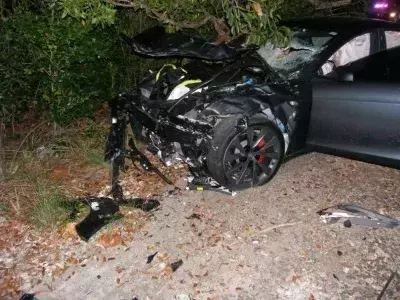



Unveiling Truths: The Autopilot Trial that Redefines Automotive Responsibility
The 2019 Florida Crash: A Tragic Catalyst for Legal Action
In April 2019, a Tesla Model S, operated by George McGee, collided with a stationary SUV in Key Largo, Florida, at speeds exceeding 50 mph. Despite McGee's claim of being distracted by a dropped phone, the vehicle's Autopilot system was reportedly active. This devastating incident resulted in the death of 22-year-old Naibel Benavides Leon and severe injuries to Dillon Angulo, reigniting concerns about the reliability of Tesla's driver-assistance technology.
Legal Showdown: Tesla's Autopilot System Under the Microscope
More than six years following the tragic event, a federal jury trial is set to commence in Miami, as Angulo and the Benavides family pursue legal action against Tesla. While the driver has settled, the core of this lawsuit revolves around allegations that Tesla has misled consumers about the true extent of its driver-assistance systems' capabilities, implying they are more autonomous than they truly are. This trial is particularly noteworthy given Tesla's history of resolving similar cases outside of court.
The Discrepancy Between Tesla's Claims and User Reality
Tesla maintains that its vehicles are secure as long as drivers remain vigilant and engaged. The company asserts that, when utilized correctly, its sophisticated driver-assistance features enhance safety and mitigate accidents. However, plaintiffs' attorneys argue that Tesla's marketing of Autopilot has excessively exaggerated its functionalities, fostering an over-reliance on the system among drivers. This contention is underscored by federal investigations into Tesla's Autopilot and Full Self-Driving (Supervised) systems, as well as a past staged video that falsely depicted the car driving itself.
Judicial Scrutiny: Reckless Disregard for Human Life?
U.S. District Judge Beth Bloom's decision to permit the wrongful death lawsuit to proceed highlights the court's view that a jury could potentially find Tesla culpable of "reckless disregard of human life for the sake of developing their product and maximizing profit." This ruling sets a precedent, suggesting that manufacturers of advanced driver-assistance systems may face increased scrutiny regarding their product claims and the real-world safety implications of their technology.
Transparency and Accountability: Data Disputes and Corporate Defense
A contentious aspect of the lawsuit involves accusations from the plaintiffs that Tesla has withheld crucial data from the crash, a claim the company refutes. Meanwhile, Tesla, through its CEO Elon Musk and social media statements, continues to defend its safety record. Musk frequently highlights the high number of annual traffic fatalities as a broader context, arguing that Tesla's technology contributes to reducing this figure. The upcoming three-week jury trial is anticipated to be a rigorous examination of these claims and counterclaims, with significant implications for the future of autonomous vehicle technology and consumer protection.
